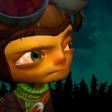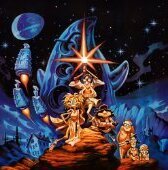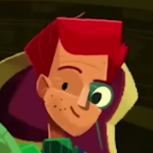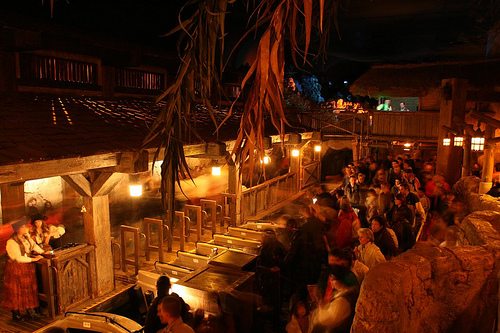Leaderboard
Popular Content
Showing content with the highest reputation on 11/20/22 in all areas
-
2 points
-
2 points
-
I know I’m late to this, but I think it’s an interesting area. With regard to the CMI team’s perspective on MI2’s ambiguity: I always figured that literalizing its predecessor’s ending was more about making a judgment call not to disappoint what they perceived were the audience’s expectations (“What’s this soluble daydream hokum doing in my pirate game?”), rather than it necessarily representing a personal distaste or rejection of the innuendos Ron was making. Skirting that stuff may have in fact been partly out of respect, with the thinking being “Only Ron can wrap up whatever it is he was driving that, so we’ll just proceed from the escape hatch we were given instead of trying to divine intentions he himself might not have mapped out.” Which, by Ron’s own admission, he in fact hadn’t. Maybe I’m giving too much credit for forward-thinking here, but just look at the way, by intention or by accident, things worked out in the end: Ron was able to complete the statement he was making without having to pretend the other games didn’t exist. Those interim sequels successfully kept the bench warm for the creator’s eventual return -- they didn’t override Ron’s vision so much as postpone it, and it’s probably ungenerous to think this happened entirely by dumb luck. Every team brought their own tastes to the way they grappled with that shoddy seventeenth century electrical wiring, but it was grappled with. CMI seems to have the reputation of being the Monkey Island game that steers the clearest of the meta-angle that Ron was toiling in, but I think it’s a little underappreciated in this regard. It definitely carries the torch of the first two games in terms of perpetuating that surrealistic undercurrent, the anachronism/fourth wall jokes, and the near-constant theme park evocations. Both Plunder Island and Blood Island have plenty of Disneyland nods both subtle and overt, and of course the entire final act takes place at a danged theme park. The fact is, a game that truly flouted the weirdness of the series and insisted on being a pureblood, risk-adverse pirate adventure with an inflexibly straight face would not look like CMI. We know Ron wouldn’t have made CMI, but that game’s team was neither unconscious nor careless about recognizing the substructure going on in his games, in my opinion, and they made an earnest attempt to do that aspect justice. In the wake of Ron finally getting to have his say after thirty years, I actually find myself more impressed than ever with the ways the middle chapters walked that tricky line they were lumbered with.2 points
-
1 point
-
I don't care what the group wants 😉 Outlaws might be one of the next projects.1 point
-
The way I see the ending (having finished it a couple of days ago) isn't "it was really all a dream". To me this ending changes nothing on the discourse about "is the Monkey Island world a fantasy or reality?". We now kinda know what Ron thinks, thanks to the interview with Cressup, but in that same interview he does states that what he thinks doesn't matter. He does imply what his vision is, but never states it, because the ending of the game (so the "canonical" secret) is made open to interpretation. Even better, the game let's you decide what the secret of Monkey Island is, and that is the real answer. To me the meaning of the ending is that it really doesn't matter if it's real or not. Monkey Island is a videogame world, it's not real to begin with, but it feels real to us, to Boybrush, so in our mind it becomes real (not in a delusional way, like someone suggested, but in a fantastical way). But we do have to acknowledge that it's not real, that it's fiction, and that there's a moment where it's time to get out of the fiction, even if it's too early for us. We can decide to stay in the fiction, be greedy and selfish and isolate ourselves in our own fantastical world, or get out and share it with those you love. Maybe it's a bit cheesy, but that's how I perceived the ending. Probably not what they meant, but I don't really care about that, because I know I'm not getting it "wrong", and neither is anybody else. Ron himself said that he didn't want people getting stuck on the idea that whatever he says is canon and that that's the way it is and can be no other way. This ending, for me changed nothing about my enjoyment or perception of the other games (I mean, not in the grand scheme of things, it's not like I'm going to play Curse and think "oh, what does it matter, it's only a fantasy world in a theme park...").1 point
-
Finished the game a couple of days ago and needed some time to gather my thoughts. Okay... I absolutely loved it. I was hoping I would love it but I never expected it all getting to me so much as it did. For years I was never that much excited for the series to ever be continued by Ron, mostly because of the now infamous article where he said he would ignore everything after 2. I never liked that. I really love every game in the series and the fact that it is one continuous story (despite some small continuity hiccups in Escape) and wasn't looking forward to Zelda-like alternate timeline/version/whatever shenanigans being added to the series. I also liked Guybrush and Elaine being together. I completely understand that wasn't Ron's original intention, especially after how their relationship is in LeChuck's Revenge, but again, for me the games after that cemented the relationship. Tales was about them having issues and working on them to come out of it better by the end. Undoing all of that would feel weird (and perhaps slightly spiteful?) to me. So imagine my face when the camera pans to the right, revealing daddy Guybrush sitting on the bench and it all hit me at once. Not only did Ron and Dave respect the relationship, they doubled down on it. And tying it together with Revenge's ending is just genius. By doing this framing device, suddenly every weird thing in the series, every inconsistency, everything can be explained. And it gives it all sooo much heart. Honestly, the tears came hard when everything clicked in my mind, after a simple camera pan to the right. Ugh. Then the game itself. I don't have much to say next to I loved it all. The structure being somewhat of a mashup of 1 and 2 (but with details and puzzels dialed up to 11; 4 map pieces? 6 keys!) worked really well with the themes of nostalgia and growing up. Like many of you, my first reaction after the ending was "what?!" but after letting it all sink in a bit more, I love it so much, it's perfect. Like @Jake said earlier, there's a very clear theme going on of Guybrush and LeChuck going through the same motions, over and over again. I think there are many ways to interpret the ending but the main thing for me is; Guybrush chooses to let go of his obsession because he sees what it does to others. Not only in LeChuck vs the new Pirate Leaders, but also in his own actions after that talk with Elaine in the Monkey Island jungle. Granted, it's not a realization of Guybrush that is talked about aloud but still, that scene is there for a reason, and it's right before he letting go. I think the way story ends is foreshadowed throughout the entire game, especially with the whole Chums-story puzzle. Guybrush learns to change his story so it would make a better and exciting story (like mentioned before in this thread, see Pan's Labyrinth and Big Fish). And it worked! Because we'll probably talk about what's real and what isn't for a long time, just like the ending of Revenge before this one. Random thoughts: - It's funny how ideas and themes from both Escape and Tales are also in this game. Escape: classic piracy being outdated and making way for something new and hip. Tales: the theme of going through the motions and Guybrush' getting confronted with him being kind of an asshole, destroying lives in his way. - Widey Bones is an interesting character because we know almost nothing about her and the fact that a lot of her dialogue at the beginning hints at the ending makes it all the more theory-fueling. - Was it just me or did Herman Toothrot's ending getting stuck in the cave and Guybrush saying it's another tale a way of linking it to Ron's The Cave? - Loved we got nods to Escape (sorry, I recently played it and still love it a lot) in Carla and Otis' dialogue. Slightly sad we didn't get a more direct nod to the Toothrot-Marley thing. - The plaque at the end saying "original secret" says it all I think. It's good that stories change as we get older. Nothing has to stay or be exactly the same as it was in the past, that's the whole point of this game. Guybrush loving things like Stan's old place or being on Monkey Island while he hated it before perfectly captures the nostalgia theme. - Did we ever see Madison die? This was the only part that felt weird/rushed to me, as it builds up both a teamup and a betrayal but then shows very little of it. Madison being the final one going up against LeChuck instead of Lila would have been more logical I think? Unless I'm missing something... - Murray being in the game so much was great. Love the short reprise of his theme from Tales when he appeared. - Speaking of the music; I want this soundtrack asap. - Loved LeChuck's crew and the diversity in characters. Also that there was just another demon there like it wasn't anything strange or weird, he's just there. - @Dmnkly I can't say enough good things about your work in the game (or the entire series). Amazing work as always! Hope we get to enjoy your Guybrush for many more games to hopefully come (but if not, this was a perfect ending) - Random Ron story from years ago when he visited Amsterdam and he hung out with a bunch of fans. I remember asking him what he thought about the Toothrot twist in Escape and he said he didn't know what I was talking about. I asked him to spoil it to which he said yes so I told him. I still remember his reaction being a very blank stare and then just ".....huh". Best poker face ever. I probably have more to say but that's it for now.1 point








